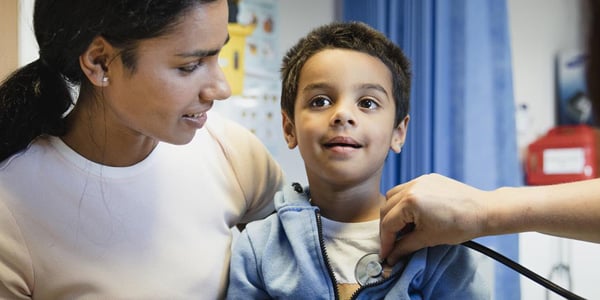
Coming to Emergency
The SickKids Emergency Department is there for you when your child is sick and in need of emergent care. The Emergency Department is open 24 hours, every day of the year. We are committed to providing your child with safe, timely, high-quality care.
Learn what to expect in our Emergency Department, from arrival to being seen, and what you need to know before coming.

Unsure whether to visit the Emergency Department?
Please contact your primary care provider to see what options are available, or use our Virtual Urgent Care program. Our symptom checker can help you find out what type of visit is needed for your medical concern and if you are eligible for a Virtual Urgent Care visit with a SickKids ED physician.

Emergency Department entrance
The Emergency Department is located on the Main Floor of the Atrium, near the 170 Elizabeth Street hospital doors and Main Information Desk.
Parking
Parking is available underground and street level. The entrance to our parking garage is located on Elm Street and is open 24/7.
Prepare for your visit
This information will help you prepare for a visit to our Emergency Department.
Safety and infection prevention
If you are not feeling well or have any symptoms, please make every effort to find someone else who can bring your child to the hospital.
Masks are available to wear in the Emergency Department all through the year. To protect you and others while you are visiting, SickKids recommends wearing a mask if you’re able.
Two family caregivers are welcome to accompany each patient in the Emergency Department.
The Emergency Department is a busy place with limited space. Families are encouraged to make alternate arrangements for other children if possible, or use the PlayPark and other Family Spaces at SickKids.
To help us care for your child and prevent disruption to your child's routine, please bring any of the following that your child may need. Please disinfect all items you bring to SickKids before and after your visit.
- Ontario Health Insurance Plan (OHIP) card
- Current, labelled medications your child is taking, including prescriptions or over-the-counter medications
- Written plans or summaries you have about your child’s medical condition
- Water bottles and nut-free snacks
- Entertainment, such as books, tablets and games
- Phone chargers
- Diapers and formula if needed
When you arrive at the Emergency Department, the first person you will meet with is a triage nurse who will assess your child's medical care needs. Based on this information, our staff decide who gets seen first. Children are treated based on need, not the order in which they arrive. The more seriously ill or hurt the child is, the more quickly he or she gets treated.
After the triage nurse has assessed your child, you will be asked to register and then take a seat in the waiting room. As part of registration, you may be asked to fill out a Health Equity Demographic Information Form, called Health Equity: Your Health Matters. This form asks questions related to your ethnicity, gender, income and more. We are collecting this information to learn about health-care equity gaps and create programs and services to ensure we are providing the best care to all our patients. None of the information you tell us can hurt the care you receive at SickKids, but can only help us understand you and your unique needs. It is your choice to give SickKids this information; patient care will not be affected if you choose not to fill out a form.
As always, the sickest patients are seen first, and families may experience much longer than normal wait times for non-emergent issues.
All children are checked by a triage nurse as soon as they arrive, but it may be a busy time during certain periods of the day or season. For example, evenings are very busy, especially between 6 p.m. and 12 a.m.
If you have any concerns, or your child's condition changes, talk to the triage nurse. We appreciate your patience.
Please talk to the triage nurse, your child’s nurse or a doctor before giving your child anything to eat or drink, in case a special test (requiring an empty stomach) may be needed. If your child does eat or drink something, it may delay their treatment.
When it is your child's turn, an assessment will happen in two stages.
- You will meet your child's nurse who will examine your child and ask more questions.
- The doctor will continue the examination and arrange for your child to be treated.
The Emergency Department paediatrician has final responsibility for your child's care.
SickKids is a teaching hospital. We not only look after children who are ill, but we also teach people who want to be doctors, nurses, and other health care workers. These trainees will be involved in your child's care. They work with the nurse and paediatrician who are responsible for your child's care.
In some cases, the paediatrician may decide that your child needs to see a specialist, which may require an additional wait. We may decide that your child should receive care at your local hospital. If so, we arrange for your child's admission and transport.
Internet is available for families.
Username: SickKids Guest
Password: beourguest
During long waits or uncomfortable procedures, please ask our Child Life Specialist or volunteers about these supports available for your child: toys and distractions, autism sensory cart, tablet, DVD player, VR goggles.
Once in your examination room, ask your team if you would like blankets or a chair that pulls out into a bed.
The prayer room/chapel is located on the first floor up the Atrium elevators.
Please let a team member know if you run out of any important infant supplies (diapers, breast pumps, bottle warmers, formula or pacifiers). We can provide replacements. The breastfeeding room is located near Shoppers Drug Mart.
The hospital does not supply phone chargers.
Water and ice machines are located near the nursing station. Food and drinks may be purchased from one of our food retailers during their business hours. There is a vending machine in the Atrium that serves hot and cold food 24 hours a day. Let a team member know before leaving the Emergency Department.
Please ask a nurse before feeding your child as it might affect their treatment.
What to expect in the ED
Children are treated based on need, not the order in which they arrive. The sickest patients are seen first.
A typical visit to the Emergency Department will involve several steps. You may need to move several times as you wait. We appreciate your cooperation.
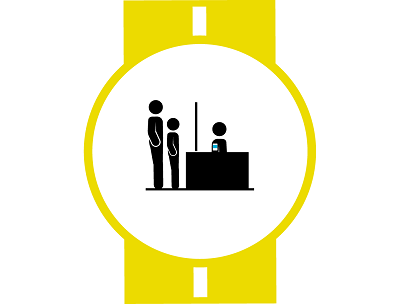
Triage 1
When you arrive at the Emergency Department, the first person you will meet with is a triage nurse who will ask for your child’s health card, your reason for visiting and screening questions.
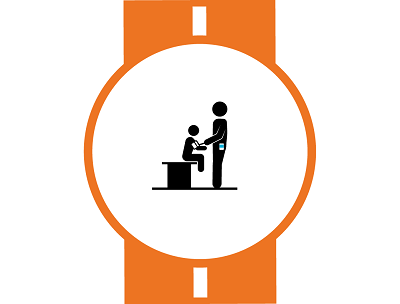
Triage 2
A second triage nurse will ask more questions about your reason for visiting, examine your child and place an ID bracelet on your child.
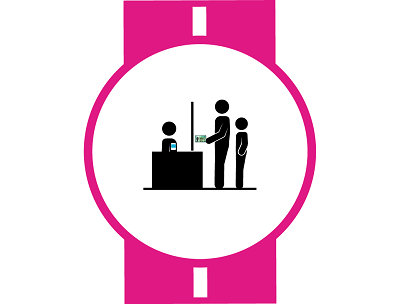
Registration
The registration clerk will ask for your contact information and your child’s health card. They will also ask whether you would like to be approached about research studies.
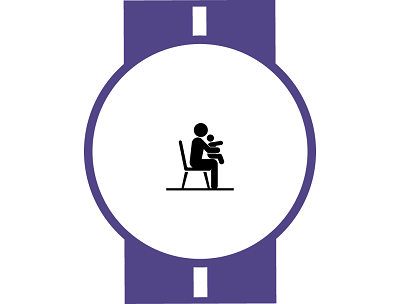
Waiting area
This is where you will wait to see a doctor. You may be asked to move multiple times during your visit to keep everyone physically distanced and safe. Please let a nurse know if your child’s condition worsens.
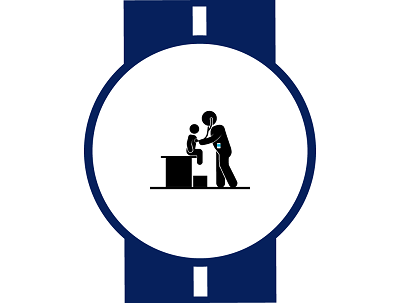
Exam room
A nurse will take your child’s vital signs and examine your child. The doctor will ask questions about why you came, your child’s symptoms and health history and examine your child.

Tests and specialists
Your child may have to see specialty doctors and/or have tests done, such as a blood or urine test, an X-ray or an ultrasound.
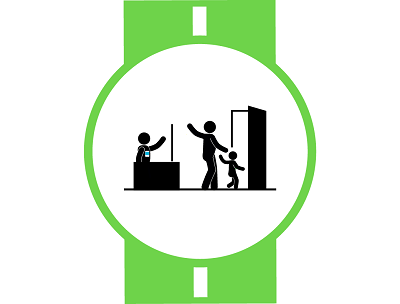
Leaving the Emergency Department
Your child may be discharged home, transferred to another hospital or admitted to a SickKids inpatient unit.
After your child is treated, you will be given written instructions to take home.
You may be asked to visit your family doctor or to make an appointment in one of the hospital clinics. There are different ways to make appointments for our clinics. Your child's doctor will explain the next step.
If you need a clinic appointment, please visit the Coming for Appointments section of our website for more information.
If your child's condition does not improve or gets worse, you should contact your child's regular doctor or take your child to the closest Emergency Department.
The doctor may decide that your child should stay in the hospital for further care.
When a room is ready, you will go to the Admitting Department registration. Then, we will hand over your child's care to the medical and nursing staff on the unit that your child will be staying on.
While you wait for a room your child will continue to be monitored and cared for by the Emergency Department staff.
For more information about staying at SickKids, visit the Staying Overnight section of our website.
Educational resources
![]()
AboutKidsHealth is a health education website for children, youth and their caregivers, with trusted answers from SickKids experts. Learn about common conditions and injuries often treated in the Emergency Department Learning Hub.
A fever can be a sign that the body is fighting an infection. Learn how to properly care for a baby, toddler or child with a fever.
Learn how to correctly take your child's temperature when they have a fever.
Learn how acetaminophen and ibuprofen can be used to help make your child more comfortable and bring down their fever.
Colds are caused by viral infections in the nose and throat. Learn about the causes, duration, prevention and treatment of viral upper respiratory infections.
Although the flu is very common, it can be dangerous for young children and those with compromised immune systems or other underlying diseases. Learn more about the flu and how to protect against it.
Keep the whole family safe, healthy and happy during the cold weather season with these winter tips.
Learn about common allergies and what to do if your child has an allergic reaction.
Anaphylaxis is a severe reaction to an allergen. Learn how to prevent and identify anaphylaxis and how to respond when someone has a reaction.
Learn about asthma attacks and what you need to know about care after a hospital visit.
Learn how we’re making SickKids facilities, programs, policies, and services more accessible for everyone.
By providing feedback about your visit to SickKids, we can continue to improve the patient and family experience.
Securely access you or your child’s SickKids health records online.


